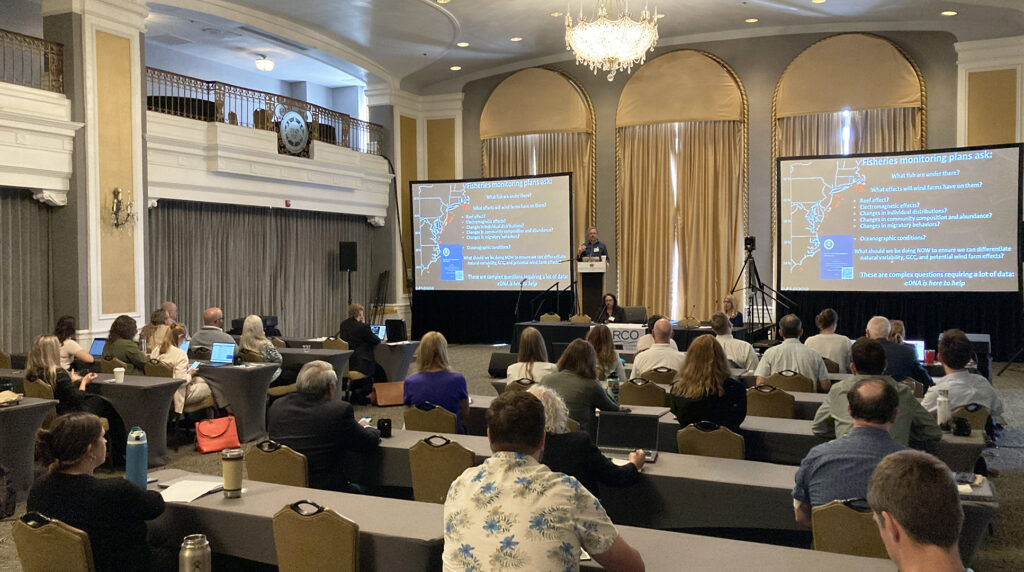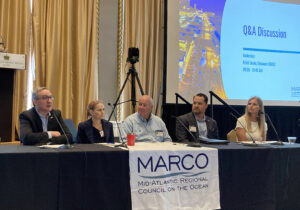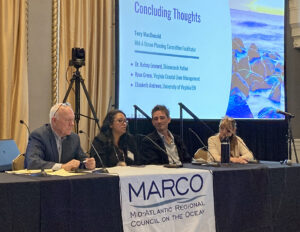
Videos of presentations and panel talks from the 2025 Mid-Atlantic Ocean Forum are now available for viewing online. Now in its seventh year, the Forum is the region’s premier annual event dedicated to ocean planning, gathering ocean professionals and stakeholders representing federal and state agencies, Tribal entities, marine industries, nonprofit research and advocacy organizations, and the public.
This year’s Forum was convened by the Mid-Atlantic Ocean Planning Committee (Mid-A OPC) from May 6-7 in Baltimore. Click here to view an agenda and speaker bios.
The Forum kicked off on May 6 with three discussion-based sessions focused on the work of Mid-A OPC work groups. An initial two-part Maritime Commerce and Navigation Safety session assembled industry stakeholders to explore what data, tools, and coordination will be needed in the future to support safe, efficient navigation in a changing seascape. It was followed by a roundtable discussion on regional data and information needs related to coastal hazards mitigation and resilience in the Mid-Atlantic.
The day concluded with an interactive discussion on spatial data needs and gaps related to seafloor sediments and habitats off the Mid-Atlantic coast. Input gathered from Forum participants is now helping guide efforts by the Mid-Atlantic Regional Council on the Ocean (MARCO) to improve understanding of available baseline data resources and develop products for the Mid-Atlantic Ocean Data Portal that can support ocean planning.
Day Two: Talking Trash, Board Games & Ecosystems
 Day two of the Forum featured a full slate of expert panels, poster presentations, and networking opportunities. Videos of the day’s proceedings are available on the Forum page and MARCO’s YouTube channel (the first day was not recorded.)
Day two of the Forum featured a full slate of expert panels, poster presentations, and networking opportunities. Videos of the day’s proceedings are available on the Forum page and MARCO’s YouTube channel (the first day was not recorded.)
The day kicked off with a session exploring the challenges and strategies involved in sustaining the Mid-Atlantic’s ocean economy, with presenters highlighting key sectors including the maritime supply chain, aquaculture, tourism, and recreation. Among them were Waterfront Partnership of Baltimore Vice President Adam Linquist, who spoke of how a googly-eyed riverboat named “Mr. Trash Wheel” became a local icon and educational force that is removing tons of trash from the Inner Harbor.
“I want the Mr. Trash Wheel story for every one of our issues because I really think that’s what it takes,” said Mid-A OPC State Co-Chair Mike Snyder, of the New York Department of State. “It’s communicating the essence of what’s important, doing it simply, doing it in a way that resonates personally, and doing it in a way that people can actually have fun with and appreciate.”
The next session explored innovative approaches to improving ocean planning through enhanced data sharing and governance, with topics ranging from expanding water level monitoring in the Mid-Atlantic to engaging stakeholders through an ocean planning board game. The second day’s expert presentations concluded with sessions dedicated to using environmental DNA (eDNA) to improve fisheries monitoring and work taking place to protect endangered species and important ocean ecosystems in the region.
Final Thoughts: Advancing Priorities
A closing panel reflected on key takeaways from the two days and how they could inform MARCO and the Mid-A OPC’s priorities moving forward. A recurring theme throughout the Forum was the importance of communicating the value of the ocean and coastal stewardship to the economy.
Incoming MARCO Chair Ryan Green, of the Virginia Coastal Zone Management Program, noted that in times when budgets were lean and uncertain, MARCO states and partners need to communicate with each other closely on their most critical needs and figure out “Where do our chips align?” He advocated expanding the universes of people involved in data collection, pointing to citizen science projects and collaboration with commercial fishing captains in ways that can support them economically as examples.
 Mid-A OPC Tribal Co-chair Kelsey Leonard, of the Shinnecock Nation, said her participation on the eDNA panel reminded her of how far partnerships such as those between Tribes and citizen scientists had come since discussions first began about a decade ago. She added that she took heart in seeing participants talk over the two days about ways they could support each other’s work and ensure it advanced even as traditional funding sources have shifted. In this respect, the Forum, MARCO, the Mid-A OPC and the Portal are playing an important role in educating the public and keeping conversations going on ocean planning issues.
Mid-A OPC Tribal Co-chair Kelsey Leonard, of the Shinnecock Nation, said her participation on the eDNA panel reminded her of how far partnerships such as those between Tribes and citizen scientists had come since discussions first began about a decade ago. She added that she took heart in seeing participants talk over the two days about ways they could support each other’s work and ensure it advanced even as traditional funding sources have shifted. In this respect, the Forum, MARCO, the Mid-A OPC and the Portal are playing an important role in educating the public and keeping conversations going on ocean planning issues.
“In today’s climate, we constantly have to prove why things count, why they matter, why they’re a good investment of taxpayer dollars, and I think the Portal does that in 1s and 2s and spatial visualization,” Leonard said. “And beyond that, some of the features that folks haven’t mentioned today, but exist on the Portal, are the stories, the blogs and the videos that are posted there. There’s a lot of intermodality that you can experience there.”
